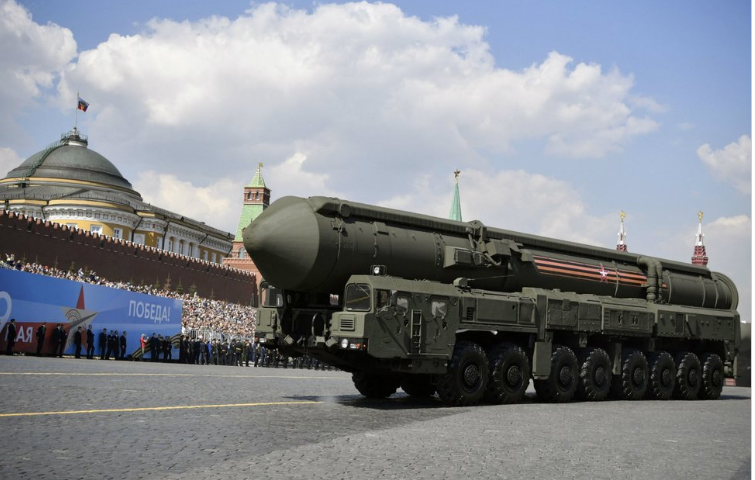The pending demise of a treaty to prevent nuclear weapons proliferation comes at a particularly dangerous time, nuclear experts and former officials say.
THE TRUMP administration is heading toward a nuclear arms race with Russia, according to security experts and former officials who are raising alarm about what they consider the White House’s intention to withdraw within days from a Cold War-era treaty that serves as one of the few remaining restrictions on developing nuclear weapons.[
The six-month deadline the Trump administration gave to Russia to return to the terms of the 1987 Intermediate-range Nuclear Forces Treaty, or INF, expires on Friday with the White House providing no sign it will back away from threats to leave the treaty to punish Moscow for defying its obligations. It remains unclear whether Congress would be able to prevent the administration from abrogating the pact.
President Donald Trump’s decision to leave the agreement positions the U.S. one step away from a security environment without any agreed upon restrictions on developing new nuclear weapons.
That consequence comes at a particularly dangerous time as great power competitors, including the U.S., Russia and China, prepare for new conflicts at sea, on the ground and in the air, as well as new potential battlefields like space.
Those who track closely the development and use of nuclear weapons say the White House’s decision will strengthen the possibility of conflict.
“The risk of nuclear weapons use is already unacceptably and unnecessarily high. The death of the INF Treaty, without any plan in evidence to compensate for the deterioration of arms control, will only accelerate our downward spiral into nuclear chaos and potential catastrophe,” Jon Wolfsthal, a former top adviser to the Obama administration for nuclear proliferation issues, said in a statement Wednesday.
Wolfsthal, now director of the disarmament organization the Nuclear Crisis Group, said Trump did not make a serious effort to encourage Russia to return to the terms of the deal, signed by Ronald Reagan and his Soviet counterpart, Mikhail Gorbachev. Along with national security adviser John Bolton – known for his aversion to agreements limiting America’s use of its own weapons – the White House has “killed an important tool for preserving stability and safeguarding global security,” Wolfsthal said in the statement.
Russian Deputy Foreign Minister Sergei Ryabkov said Tuesday that Russia does not plan to take any new steps with regard to the INF Treaty.
The collapse of the treaty would have knock-on effects for the two countries and their allies– the types of weapons banned in the treaty were of particular concern for countries in Western Europe. NATO Secretary General Jens Stoltenberg has worked in recent months in an attempt to bring the participating countries back into compliance with the deal but acknowledged in June that the security bloc, originally founded to contain the Soviet Union, was already preparing for an escalatory outcome.
“NATO continues to call on Russia to return to full & verifiable compliance with the INF Treaty. But we also have to prepare for a world without INF & today [defense ministers] have agreed that NATO will respond should Russia fail to return to compliance,” he tweeted at the time.
In announcing the U.S. threat earlier this year, Trump cited Russia’s reported violations of the treaty but also lamented that China was not involved in it – even though China was not considered a great power adversary at the time of the treaty’s creation.
However, the White House also has not addressed Russian complaints about the U.S. compliance with the treaty, which some experts consider valid. The U.S. has angered Moscow by installing missile defense systems in Poland and Romania that are arguably capable of launching cruise missiles. Russian officials have additionally cited U.S. drone development and use, which they say also violates the treaty.
“To claim the United States is justified in pulling out of the treaty because of Russian violations does not take the full picture into account,” wrote David Wright on behalf of the Union of Concerned Scientists in an open letter released Wednesday. “What apparently underlies this decision is the administration’s aversion to negotiated agreements that in any way constrain U.S. weapons systems.”
The treaty has resulted in the destruction of more than 1,800 Soviet missiles and more than 800 American ones.
Both Wright and Wolfsthal expressed concern that withdrawal from the INF Treaty would leave only one other agreement – New START, signed in 2010 – between the U.S. and Russia governing their nuclear stockpiles. Trump and Bolton have indicated they plan to pull out of that treaty as well or allow the terms to lapse when it comes up for renewal in 2021, creating the first time since 1972 that the two nuclear powers will operate without any agreed-upon nuclear constraints.

